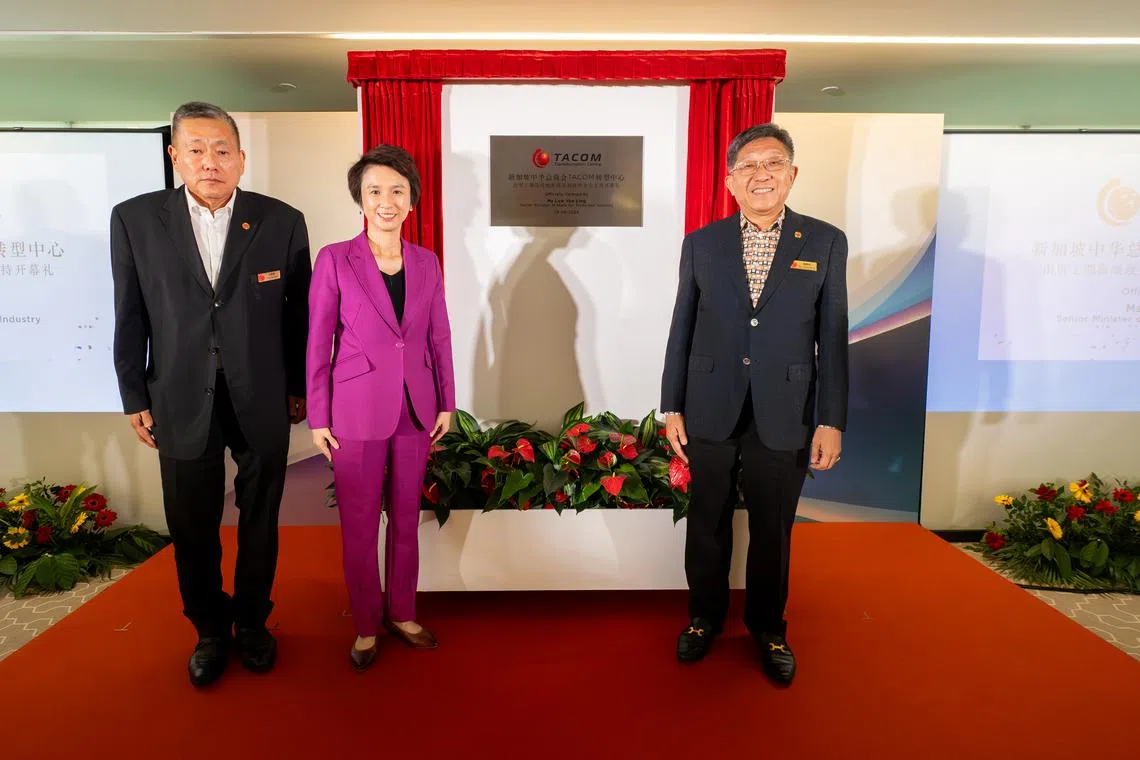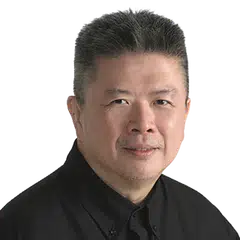New centre tailors transformation solutions for Singapore trade associations and chambers
Sign up now: Get ST's newsletters delivered to your inbox

(From left) Tacom chairman Thomas Pek, Senior Minister of State for Trade and Industry Low Yen Ling and SCCCI president Kho Choon Keng, at the unveiling of the new centre's plaque on Aug 28.
PHOTO: SCCCI
SINGAPORE - Trade associations and chambers (TACs) seeking to adapt for the long term amid rapid technological changes will receive customised help through a new centre.
The Trade Association Committee (Tacom) Transformation Centre, established by the Singapore Chinese Chamber of Commerce and Industry (SCCCI) with support from Enterprise Singapore, will also boost the TACs’ secretariat capabilities in key areas such as sustainability, digitalisation and internationalisation.
This new initiative goes beyond the basic advisory and shared services currently being offered, and will seek to provide in-depth strategic guidance, said Senior Minister of State for Trade and Industry Low Yen Ling.
Speaking in Mandarin at the launch of the centre on Aug 28, she said it “comes at just the right time because we are in an era of rapid technological development, where products and services are changing constantly”.
“Transformation is no longer a question of whether it is needed, but rather a question of when to start. The answer, of course, is as soon as possible,” she said.
Ms Low noted that the latest move by the SCCCI is the culmination of its earlier efforts in setting up the Trade Association Hub (TA Hub) in 2017, as well as the subsequent launches of the TA growth model and competency framework in 2022.
Overall, it reflects the SCCCI’s commitment to build a stronger community among the TACs, she added.
There are more than 300 trade associations and chambers across Singapore and of these, about half are part of the SCCCI family, which has a network comprising 5,000 corporate members of varying sizes and hailing from a wide spectrum of trades and industries.
On the challenges TACs face, Tacom chairman Thomas Pek said it is difficult for a stand-alone trade association or chamber to get its voice heard, let alone find solutions.
But within the framework of the TA Hub, not only will the feedback be heard, but solutions can also be found. “The monthly meetings are well attended by the respective government agencies who are there helping to resolve issues raised by the TAC members,” he said.
He gave the example of how the speed limit for truck-mounted cranes were doubled, from 20kmh to 40kmh, after members raised the issue at such meetings.
Meanwhile, Singapore Motor Cycle Trade Association president Rex Tan said that among the smaller trade associations, it is particularly challenging to keep institutional memory intact.
“This is because office-holders tend to volunteer their time and rotate out every few years, while engaging full-time staff is an endless cycle to hiring and training because of the lack of progression and upward mobility,” he said.
Echoing this view, Singapore Furniture Industries Council president Phua Boon Huat said most trade associations tend to be lean in terms of both manpower and resources.
“The new Tacom Transformation Centre will help not only by pooling resources to help devise solutions, but also have a platform where best practices in key areas of digitalisation, sustainability and internationalisation can be shared among members who can then collaborate to address common problems,” he said.
Ms Low said of the moves to help TACs: “These developments highlight the growth of our TAC ecosystem, which ultimately benefits and supports the future and growth of our enterprises.”
She added that the trade bodies and chambers play a vital role in Singapore’s enterprise ecosystem and serve as a bridge between businesses and the Government.
Not only do they ensure that industry concerns are heard and addressed, but small and medium-sized enterprises are also empowered to take on challenges collaboratively, drawing on shared resources.
Quoting from Prime Minister Lawrence Wong’s comments during his National Day Rally speech,
She added: “Within this overarching framework of pro-business philosophy, the Government will continue to encourage and assist enterprises, especially small and medium-sized enterprises, in actively transforming to meet future economic demands.
“I am confident we are ready to face those challenges together.”



